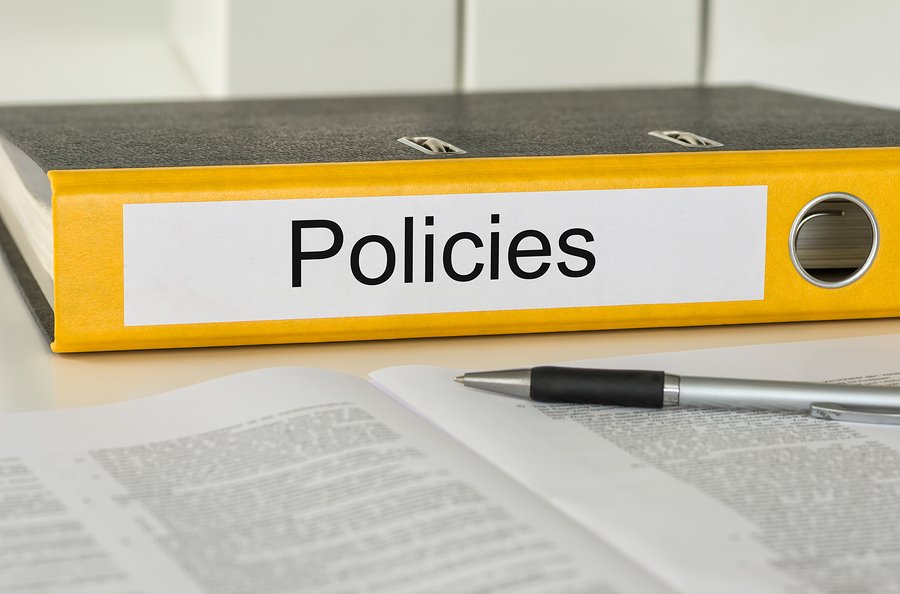7 Reasons Every Workplace Needs Policies
ByOlga Shepherd
HR Advisor, Key Business Advisors
“Why,” you may ask, “do I need policies in my business?”
The simple answer is, “Because you have people working for you.” With human nature being what it is, employees will test limits and act “creatively” in workplace situations, so you need a strategy for developing, communicating and enforcing a set of policies and practices that reflect standards of acceptable behaviour.

1. Workplace policies limit your liability and protect your business.
A written policy can limit your liability by making clear to your employees which actions and behaviours are not tolerated in the workplace. Clearly defined policies and associated training can deter inappropriate behaviour that could expose you to a lawsuit or damage your business.
A written policy can also serve as evidence of your efforts to stop illegal behaviour from occurring. This may limit your liability if you provide proof of your written policy and that you enforced it.
2. Workplace policies set clear expectations for employees and managers.
Written policies provide a framework for a company’s operations and a clear direction for employees as well as insights into company philosophies, values and ethical standards. It is this internal framework that management can rely upon and that will ensure the company’s objectives are being met.
Without policies and procedures, it is difficult for new and existing employees to understand the organisation’s culture, expectations and requirements. Employees need to be aware of their specific roles and responsibilities, which will benefit the business in increased productivity, performance, reduction in complaints and establish equity and fairness in company processes.
3. Workplace policies hold employees to expected standards.
Good policies help your employees perform to your expected standards. Policies on employees’ behaviour at work, including the way employees relate to each other, as well as their responsibilities towards the employer and to company property, inform employees on the standard of behaviour that is expected of them at work and what the consequences of a breach will be.
4. Workplace policies help businesses avoid having disgruntled employees.
If employees understand their individual and organisational requirements, overall morale and productivity will increase. However, a successful policies and procedures strategy does more than set expectations; it also recognises and addresses people’s needs.
There are many different types of people with different opinions and personalities, and not surprisingly, they react differently to the need for policies and procedures based on those differences. For example, some people prefer having a written policy for everything, while others favour having no policies at all and would leave everything open to interpretation as situations arise. Neither of these extremes contributes to a work environment that’s beneficial to high productivity levels. The answer is found in between, with the right number and types of policies and practices that are focused on a primary goal – improving individual performance in the workplace.
5. Businesses need workplace policies to meet legislative requirements.
Policies that are required by the law, either directly or indirectly, serve the function of stating in the least what the minimum legal rights and responsibilities of both the employer and the employees are. Some employers choose to have policies which set a standard higher than that required under the law.
Some employment-related laws include a requirement that a policy be in place and that the policy fulfil certain specifications. In other areas of the law, such as equal opportunity, there is no specific requirement in the legislation that policies be put in place. However, where an employer can point to a policy, which will go some way towards substantiating the employer’s compliance with the law should the matter arise before a court or tribunal. To this end, many organisations have policies on EEO, workplace harassment and grievance handling procedures.
6. Workplace policies help businesses avoid the “I never got that email” excuse.
Although sending communication to employees regarding issues as they arise may save time, excuses such as “I never received that”, seem to be used frequently. It is imperative that policies and procedures are not only communicated, but are also understood by employees. Involving and educating employees on the standards and expectations will assist employers in holding their employees accountable, should a need arise. Workplace policies and signed acknowledgements are useful if a legal dispute arises between an employer and an employee.
7. Workplace policies save time and reduce risk.
A policy manual saves time and reduces the risk to your business. Your managers and supervisors will not waste hours coming up with decisions that others may have made before. They will not have to struggle with how to handle a “delicate” situation. They will not have to wonder if management would approve of their actions. If your policy committee researches and writes the policies well, supervisors and managers will have all the information and support they need to carry out top management’s objectives.
With a policy manual, managers and supervisors will be able to act decisively, fairly, legally and consistently. Employees will also know that their managers or supervisors are acting in accordance with business policy as well as applicable federal and state regulations. Therefore, should you be in a position where a complaint is lodged by an employee with the Fair Work Commission, the Fair Work Ombudsman or other regulating body, you can be confident that you and your managers or supervisors have acted in a fair, legal and appropriate manner.
In many cases where the employer can point to a policy to show that the employee ought to have known what his or her responsibilities were in relation to the disputed matter, the employer is likely to be in a much stronger position before a court or tribunal. Of course, a policy manual may not answer all your problems. Your staff must know what your policies are and effectively demonstrate their understanding of the reasons behind them. Without this understanding, you cannot expect them to carry out the policies with the commitment that is so vital to their effectiveness.
Additionally, it is essential that not only do your managers and supervisors know and understand your policies, but that they also conduct themselves in a manner which reflects this. If you and your team require assistance with the development and implementation of effective workplace policies that are in compliance with current legislation, email info@keyba.com.au or call 1300 4 ADVICE to speak with one of our qualified and experienced HR Advisors.




